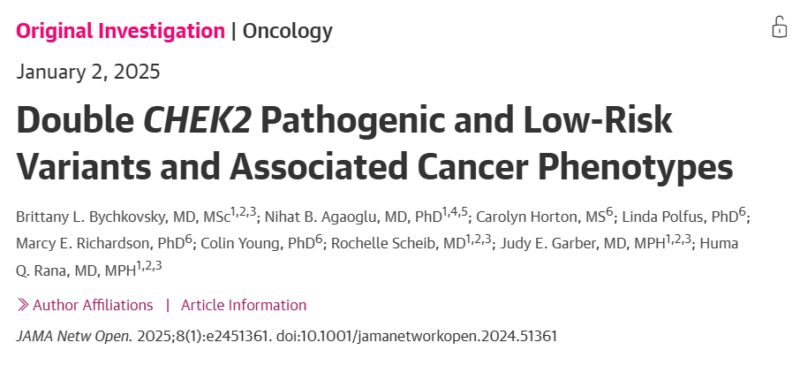Dana-Farber’s Breast Oncology Center shared an article Brittany L Bychkovsky and colleagues authored on X:
“Check out this recent JAMA Network Open on Double CHEK2 Pathogenic and Low-Risk Variants and Associated Cancer Phenotypes.”
Double CHEK2 Pathogenic and Low-Risk Variants and Associated Cancer Phenotypes
Authors: Brittany L Bychkovsky et al.

Pathogenic and likely pathogenic (CHEK2) variants (PVs) are relatively common, while low-risk (LR) variants are even more frequently identified.
Biallelic CHEK2 PVs have been linked to specific cancer characteristics, including an earlier onset of breast cancer. However, it remains unclear whether having two LR variants contributes to cancer susceptibility.
On Jan 2, 2025 an article titled “Double CHEK2 Pathogenic and Low-Risk Variants and Associated Cancer Phenotypes” was published on JAMA Network Open.
In this article, Brittany L Bychkovsky and colleagues explore whether having two low-risk (CHEK2) variants or a mix of one pathogenic variant (PV) and one low-risk (LR) variant increases cancer risk.
The study, based on genetic testing data from over 36,000 individuals, found that people with two low-risk (LR) variants had a cancer risk similar to those with just one LR variant or even the general population (wild-type controls). In contrast, individuals with one PV and one LR variant had a higher prevalence of cancer (95%) compared to those with a single PV (76.8%), though this difference wasn’t statistically significant.
The findings suggest that low-risk CHEK2 variants alone don’t appear to raise cancer risk, but when combined with a pathogenic variant, they might contribute to a more aggressive cancer profile. More research is needed to determine whether these low-risk variants act as genetic modifiers that influence cancer susceptibility.


